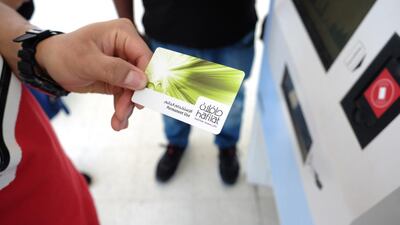ABU DHABI // The launch of the automated fare collection system by the Department of Transport (DoT) has provided a boost to Abu Dhabi’s public transport network this year.
Launched in March, the Hafilat (“buses” in Arabic) smart system aims to ensure smooth, quick fare collection and reduce congestion while getting on and off the buses.
Coin boxes on buses were completely removed on October 11, and replaced by the Hafilat smart cards.
Abu Dhabi operates 568 buses on 124 routes. The number of passengers has increased from about 3,000 a day in 2007 to more than 100,000 this year.
The number of taxis on the roads also increased, with 7,700 taxis making six million journeys per month in 2015, according to the Centre for Regulation of Transport by Hire Cars, or TransAD.
The fleet includes 7,200 regular cabs, 220 airport taxi vans, and 270 Mercedes Vito Compact vans rolled out in February.
The taxi regulator and Health Authority Abu Dhabi introduced child-safety car seats in taxis and cars for hire in May.
The initiative aims to train taxi drivers in the importance of safety seats, for the purpose of cutting the number of injuries to children in road traffic accidents.
In December, the DoT and Abu Dhabi Police released a heavy vehicles annual test manual that introduces strict new tests to make sure all lorries being driven are road worthy.
On the same month, the department launched an updated Surface Transport Master Plan in the Western Region in cooperation with the Abu Dhabi General Services Company, or Musanada.
The plan will cover main roads, public transport and rail projects, mainly related to Etihad Rail, and is aimed at increasing capacity of the main roads of the Western Region.
It will involve a series of expansion projects, new roads, bridges, tunnels and intersections serving Madinat Zayed, Ruwais, Ghayathi, Sila and Baynunah.
Road improvement works will be implemented in the short-term by 2017, medium term between 2017 and 2030, and in the long term, after 2030.
rruiz@thenational.ae
Read more on the UAE’s developments in 2015 in:
› Municipality: Abu Dhabi address system on brink of completion
› Road to Safety: Death toll on roads decreased

